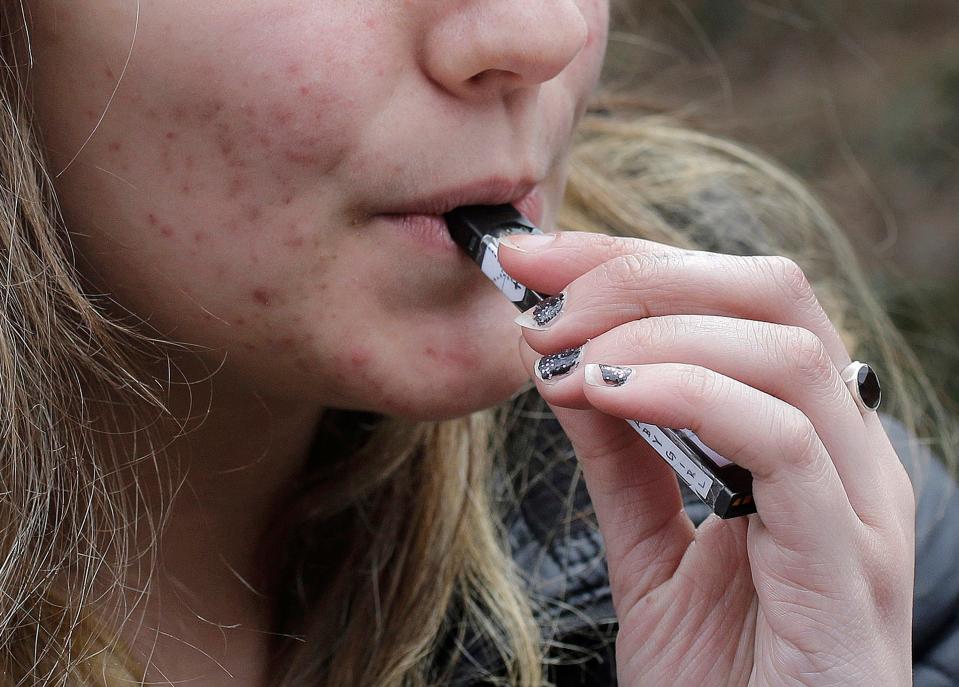Vaping is unhealthy, but banning it in Arizona could hurt teens more
- Oops!Something went wrong.Please try again later.
The law of unintended consequences makes e-cigarette bans a bad idea.
Arizona Attorney General Kris Mayes in September joined 32 other AGs in calling for the Federal Drug Administration to impose stronger regulations shielding teens from the dangers of vaping.
The coalition recommended a ban on non-tobacco flavored e-cigarettes, believing the use entices adolescents to pick up the habit.
Reducing youth vaping is a laudable goal.
Yet, however noble the AGs’ intentions, prohibiting flavored e-cigarettes will only harm Arizona teens:
It will incentivize teen smoking;
It will expose teens to adulterated vaping products;
And most importantly, it will neglect mental health issues that drive teens to nicotine in the first place.
Vaping is unhealthy, but better than cigs

Vaping is an unhealthy habit for adolescents to adopt.
But it’s a positive alternative to combustible cigarettes.
That’s because vaping exposes users to far fewer toxic chemicals, as recent studies of the biomarkers of exposure reveal.
Risk of heart attack and stroke among people who vape compared to those who smoke is also reduced. While the chemicals in tobacco smoke narrow the arteries, researchers have found that the blood vessels of smokers who switch to vaping expand, decreasing the risk of cardiovascular conditions.
Public Health England finds that e-cigarettes are 95% safer than conventional cigarettes. While vaping may still be bad for you, the truth is it’s a promising harm reduction option for people who would smoke anyway.
E-cigarettes are still addictive and have been linked to respiratory diseases.
But by eliminating certain flavors or by reducing nicotine levels to make e-cigarettes “less addictive,” lawmakers might inadvertently drive addicted teens to smoke traditional cigarettes instead.
A ban could push teens to worse choices
That’s simply a worse health outcome.
And there’s evidence suggests this is exactly what would happen.
After San Francisco implemented a ban of flavored e-cigarettes in 2018, the youth smoking rate nearly doubled, a study by Yale School of Public Health suggests.
In Arizona youth smoking is currently on the decline, but these recommendations could reverse that progress.
Per the Arizona Department of Health Services, the teen smoking rate dropped 73% between 2009 and 2019. This drop aligns with a national trend of teens choosing e-cigarettes over conventional cigarettes. Restrictions on e-cigarettes might undo years of public health progress.
Restricting fruity and mint flavored e-cigarettes has opened the door to new emerging threats to public health: fentanyl-tainted vaping cartridges.
Why a vaping ban: Makes sense for universities
Such cartridges have already resulted in multiple incidents of students being hospitalized or needing to be revived. Policymakers in some states have cautioned that black markets may emerge if flavored e-cigarettes are banned.
Illicit markets have no age restrictions, making bootleg vape pens accessible to minors.
Most teens don't vape for the flavor
The assumption that fruity flavors are the main attraction for adolescent vapers overlooks a critical reason many teens adopt the habit: as a coping mechanism for anxiety and depression.
A survey conducted by the Centers for Disease Control and Prevention found that 80% of participants cited reasons other than the flavors for vaping, instead listing the feeling of relaxation as a primary factor.
A nicotine buzz temporarily alleviates the negative emotions that are increasingly prevalent in an America ravaged by depression and mental health problems.
In 2021, nearly 1 in 5 of teens reported contemplating suicide, and more than 1 in 3 Arizona high schoolers students self-reported being in poor mental health post-pandemic. It is unsurprising, then, that 43.4% of teen vapers do so to relieve “anxiety, stress, or depression.”
Vaping is a symptom of a more serious issue impacting Arizona teens. By adopting regulations to combat vaping, lawmakers neglect the real problems facing American youth today.
Bans are well-meaning but misguided
Mayes’ initiative is well-meaning but misguided.
While it may seem rational to target e-cigarettes that come in tantalizing flavors, these measures place teens in more danger. Whether it’s driving kids to smoke cigarettes, buy fentanyl-laden e-cigs, or causing parents and public officials to overlook teen mental health, this proposal will harm those it aims to protect.
Of all the issues facing teens, vaping is the least of our worries.
Peter Clark is a contributor with Young Voices, a nonprofit dedicated to helping young professionals writing cultural and policy commentary. Clark, who has worked in international logistics, domestic logistics, and IT distribution, lives in Maricopa. On X, formerly Twitter: @blog_logic.
This article originally appeared on Arizona Republic: Vaping is unhealthy, but banning it could hurt teens more
